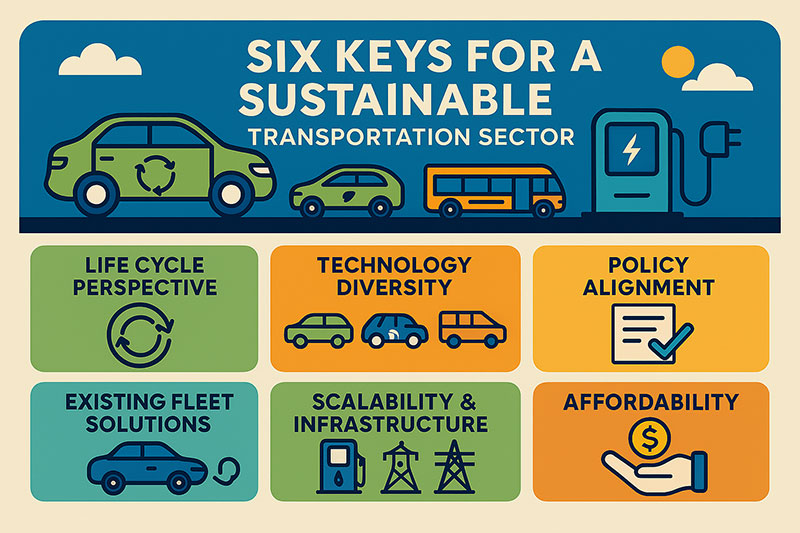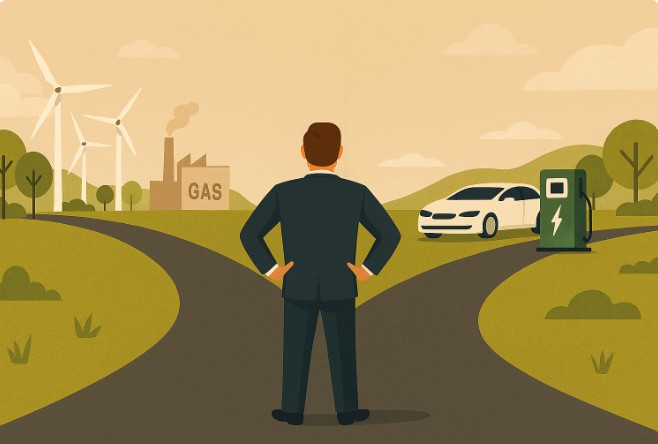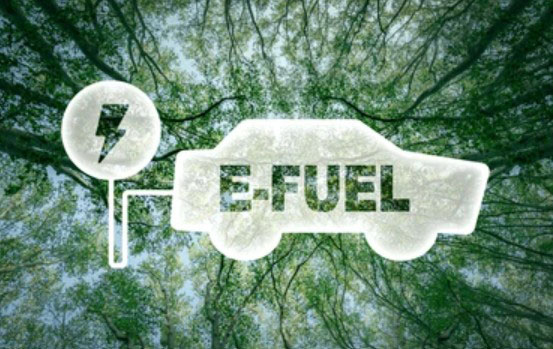August 02, 2021
It will take an aggressive approach to reduce carbon emissions from the transportation sector. The solutions must support the environment while preserving affordable transportation options for consumers. Listen as Bryan Kaus, business improvement lead (commercial) at Phillips 66, explains how the transportation industry can work together to find realistic and practical paths towards a lower carbon future.
Transcript
Hey everybody. Welcome to Carpool Chats. I’m John Eichberger, the Executive Director of the Transportation Energy Institute. Today we’re joined by Bryan Kaus from Phillips 66. And we’re going to talk about the future of the transportation energy market. Phillips 66 is a big energy company, and clearly they’re looking at the trends in transportation very, very carefully. So, Bryan, thank you so much for joining us on Carpool Chats today.Bryan Kaus:
Thanks for having me.
John Eichberger:
So let’s start off. Why don’t you just give us a little insight as to what your role at Phillips is?
Bryan Kaus:
So I’ve done a number of different things across the course of my career, but right now I’m focused on commercial business improvements, seizing different opportunities and maximizing value for the company.
John Eichberger:
Okay. So you and I had a chat a couple of days ago, and I want to tee us off from there. When we think about what’s going on in the market, clearly the Transportation Energy Institute’s looking at it all the time. We’re trying to understand what are the tools, what are the levers to get to a lower carbon transportation space, which is the priority for most of the governments across the world. And we see so many different forecasts, so many projections. Now we’re going to have 50% of light duty vehicle sales in 2030. It will be EV or whatever the forecasts are and we’re always coming into the equation with, okay, let’s be pragmatic about us. Take a look at the fundamentals. When you guys take a look at a path towards lower carbon transportation, what are some of the key drivers you guys see happening in the market that we need to be paying attention to?
Bryan Kaus:
So I think if you look out in the market, pick up any newspaper or read anything online, it’s clear that there is a transition towards electrification within the transportation sector. Nobody’s denying that. I think you look at most of the OEMs are committing something like 30 to $40 billion over the course of the next couple of years to that electrification commitment. So it’s real, but at the same time, you look at what those projection targets are. Take Ford, for example, and I think they’re looking at maybe 40% of the vehicles they’re producing by 2030, by the end of the decade, are going to be electric.
Bryan Kaus:
Now that’s their current scenario. There are outliers and circumstantial factors that come into play when you think about whether or not that materializes. At the same time, though, that still means that 60% of vehicles are going to be conventional plays in terms of what the fuel sources are. So that’s a significant chunk of the market. And then you look at the average lifetime of a vehicle, between 12 and 15 years, it’s been on the rise for the last 15 consecutively. So you’re going to have a mix within the transportation sector over the course of the next decade to two decades in terms what’s out there overall within the fleet.
John Eichberger:
And I think that’s key. I know the headlines are always talking about sales and sales are, I’ve always said are trend indicated. But we’ve done some analysis and you take a look at the Bloomberg new energy finance forecast, 60% of light duty vehicle sales by 2040 will be electric. First of all, I don’t think that happens without some significant government intervention and incentives and programs to require it. But even if that did happen, think about, we sell 16 to 17 million vehicles a year, there’s 260 million light duty vehicles on the road, we salvage 6% a year or something like that. I’ve done the calculations, at 60% sales in 2040 that’s only 27% of vehicles on the road. 73% of vehicles on the road will still be combustion engine and they may have a 20, 25 year life expectancy.
John Eichberger:
And so I really believe we’re going to have liquid fuels in the market until the latter half of this decade, of the century, maybe longer. And then you take into consideration these forecast, what’s happening right now in the market. We have a microchip shortage, we have production shortage. So all these forecasts are interesting. They’re definitely media fodder, but the reality could be quite a bit different, right?
Bryan Kaus:
Sure, absolutely. The only thing that’s certain is uncertainty. I think when we were talking the other day, I referenced a great book out there called Radical Uncertainty by Mervyn King and John Kay and their two great economists. And it just talks to all of these forecasts that you have out there. They’re anything but absolute predictions. They’re not crystal balls. They’re best guesses based on the information that you have in front of you right now. But the key there, one of the things that I don’t dismiss forecast, I think you take a look at forecasts with that information and you plan your path forward. I’m a huge fan of scenario planning where you create a whole bunch of different possibilities with your base case, your low case, your high case and everything else in between. And it’s not that you’re predicting exactly what’s going to happen, but it’s more about having the ability to move through whatever could happen and having the agility to adjust to change.
Bryan Kaus:
And I think that’s really the course, that within the energy sector, within the transportation sector specifically, but again, then beyond that, that’s really the course that we’re going to have to take as an industry to get there. And that’s going to take innovation across the board to meet energy demand. I mean, you look at the forecast, and again forecast, but you look at those projections and energy demand is projected collectively overall, not by segmentation, but it’s going to double by 2050, somewhere in that range, depending on the forecast. But that’s a huge value right there. That’s a huge number that we have to hit. And with the energy sources that we have out there today, we can’t hit those targets. Especially when you factor in where we’re trying to transition to a lower carbon footprint in terms of overall energy production.
Bryan Kaus:
That’s going to take a lot of innovative ideas, things that haven’t even been thought of yet. And that’s where research and development comes into play. I think as you look out across the next two decades, decade or two, you’re focusing on, rather than a transition, an evolution of what that energy mix looks like. So you do have hydrocarbons in that mix. I don’t see any scenario in which you don’t have some degree of hydrocarbons playing a part, at least through the mid point of the century, probably to the end of the century. But I think you’re focus on efficiency gains within the current processes in terms of how you’re running your food fuels through those mechanisms, whether that’s power generation or ice, right.
Bryan Kaus:
So that’s the exciting part about what we’re seeing out there in the marketplace and having conversations like this and the key here, I think, and I know I’m going on here, but I think the key is we don’t know what the answers are and it’s about having those conversations. So it’s not that I’m right or you’re wrong, I think it’s about trying to find that middle ground and inspire each other to find what those solutions are, because we don’t know what they are.
John Eichberger:
Yeah, and don’t ever apologize for going on. You have not seen me unchained talking about this stuff because there’s so many elements talk about. And as we start discussing [inaudible 00:07:27], other things start popping in our heads. I had a conversation this morning with a couple of people who were looking at some of the projections or the reports from the European union about how we’re going to get to their carbon targets by 2050. And you start off with that target, it’s 1.5 degrees Celsius, whatever the target is. And then you reverse engineer, what is it going to take to get there. The problem is that what it’s going to take to get there, that’s a huge challenge. So you guys at Phillips 66, you’re an energy company. Historically has been predominantly liquid petroleum based product.
John Eichberger:
When you start seeing these government forecast projections or their roadmaps to their targets, and it’s so heavily tilted towards electric vehicles, I have to assume that’s somewhat concerning to your long-term projections of your business profile. What are you guys looking at from a corporate perspective? How are you guys evolving with the times and making sure that you are still delivering energy to your end customer, the way they want it when they need it and where they need it?
Bryan Kaus:
At Phillips 66, I think we trace our roots back to 1875 with Continental Oil Company. Back then we were producing kerosene. That was before the advent of cars. We pivoted into gasoline. We’ve gotten much more efficient over the years. So we’re always looking ahead of the curve and trying to find those opportunities. That said, it’s all about strategic discipline, capital allocation. So we don’t take undue risks, but we’ve been playing a part in this space for quite some time. We have a research facility in Bartlesville, Oklahoma, which is focused on getting the maximum efficiency out of our operations across our portfolio. There, we also do research on PV, photovoltaic cells, solar cells, where we’ve set world records for efficiency. We do some fuel cell research, et cetera. A lot of great work there focusing on efficiency and new opportunities. And then I look to the fact that we announced last year, our rodeo renewed project, which is the transition of our rodeo refinery in the San Francisco bay area to one of the world’s largest renewable fuels facilities.
Bryan Kaus:
And over the course of the next couple of years, we’re going to spend about $800 million doing that. And the goal there is to lower our carbon intensity for what we’re producing. And again, change up the fuels mix out there. Also at the beginning of this year, we stood up our emerging energy organization, which is exciting. It’s a new business, standalone side-by-side with our midstream, our chemicals, our refining business. And within that organization, we’re looking for opportunities to develop the next generation of technologies, invest strategically and create that shareholder value for the longer term and provide energy cheaply and efficiently, which is ultimately the chief goal of any energy producer.
John Eichberger:
I think what you guys are doing is fantastic because I’m really concerned that there’s this assumption that electrification and transportation is the only way to address carbon emissions. And it absolutely is not the only way. It is going to be a significant portion, but we have liquid fuels. So we’re going to be consuming liquid fuels for a very long time and reducing the carbon intensity of those fuels with renewable feed stocks or leveraging biofuels, or those types of things is going to be so critical to make sure that we do the right thing by the environment. And we have to always remember this, we have to do the right thing by the consumer. And when we started up the Transportation Energy Institute, almost nine years ago, I came into it with this attitude, we are going to be studying the market and identifying opportunities to improve the market.
John Eichberger:
But anything that improves environmental performance is great, but it’s going to fail if it hurts consumers. If it is not economically viable for American families, it’s not going to survive because it’s just going to fall on its own on weight. And we have to have options, have to have various options for different use cases. You can’t electrify everything, at least not now. And so we have to be strategic about it. One size fits all approach doesn’t work. So what you guys are doing on renewable fuels is fantastic. What other things are you guys looking at? You mentioned hydrogen. There’s a lot of discussion about that as well, but what are the things or the triggers in the market that are really getting your attention and you’re trying to figure out how to navigate around as they start developing?
Bryan Kaus:
Sure. So yeah, touching on hydrogen, we have our Gigastack over in the UK where we’re working on trying to get blue hydrogen. We’ve spoken publicly about the fact that we do see hydrogen as a key element of a lower carbon future, but there are a lot of challenges out in that space, and I think everybody who’s paying attention to the conversation would agree with that. The transition from gray to blue to green hydrogen is a long one. And there are a bunch of hurdles that have to be overcome, but blue is the pathway to green. And that’s where we’re focused on that. And I know in the EU we’ve started putting in a few hydrogen sites at retail sites that we operate over there. I think we have three and they’re going to continue to expand that, to see if there are opportunities there within the marketplace. Again, driven by market economics and the viability of what’s in the overall consumer fleet.
Bryan Kaus:
And then other things that we’ve explored in terms of next steps in lower carbon intensity, we announced that MoU with Southwest, not that long ago to pursue the development of sustainable aviation fuel. So those are some exciting things that we’re looking at. And it’s, you’re absolutely right in terms of, we have to go where the opportunities are. And that ties into finding equitable solutions that meet the market demand, help the consumer maintain their quality of life while reducing those carbon footprints. And that requires smart policy making and regulatory conversations there and being part of that conversation.
John Eichberger:
I think it also requires the different stakeholders to respect one another and talk together and work together. And I see things, and everything you guys are doing is trying to improve the environmental footprint of the products you produce, the products your customers consume. That’s all designed going in same direction, yet you hear from some of the true believer advocates on the extreme going “these oil companies are just using hydrogen as a smokescreen to preserve their carbon polluting practices”. And there’s just no recognition from some of the advocates that we’re all in this together. We’re all trying to find solutions that support the environment, but also preserve affordable, reliable transportation options. And we start thinking about the evolution of the market. And one of the top topics in Washington DC is equity. Making sure disadvantaged communities, whether they be lower-income or even rural communities, are taking care of them and taking into consideration.
John Eichberger:
When we start thinking about these high tech solutions, that’s not necessarily the most viable option for those communities. And we need to have a continual discussion about how we service the customers in the way that’s best for them while we improve the environmental footprint. It frustrates me so much when there’s just so much finger pointing and accusations out there about people not caring. It seems like people think if you’re a corporation then clearly you don’t care about anybody but profits. It’s just so misplaced.
Bryan Kaus:
Yeah. I mean, you hit the nail on the head with that right there. You look at some of these new EV trucks that are coming out, your base starting price is $40,000. Does the average person have that capital to spare within their portfolio, within their income to spend on that. And that’s where you get down to trying to find those equitable solutions. It’s not all about money-making, it’s doing something, that if it’s all about profits, that’s not sustainable. It’s about finding realistic solutions. And it’s, I think the conversation, you and I talked about this before, where the polarity in us versus them is one of the biggest challenges that we face when we talk about how we solve these challenges going forward. I think you need to have those conversations to get to that equitable solution, define the common ground to get to the greater good.
Bryan Kaus:
And we’re all about providing energy and improving lives at Phillips and that’s our tagline. But to that point, energy underpins everything that we do in the economy, in our daily lives. And I think coming out of the pandemic and some of the stuff that we’ve seen more recently, we’ve all gotten a lesson in that. So that’s where we need to focus on keeping those costs down, making an equitable solution and finding realistic and practical paths forward.
John Eichberger:
Phillips 66 was one of the founding members of the board of directors for the Transportation Energy Institute back in 2013. And I remember when we transitioned to a new director, he and I had a conversation. He said, “I wasn’t sure what the Transportation Energy Institute was. I was just coming into the role, and I came to a conference and I’m sitting and I’m oh man, all these people in this room are talking about my business, but they’re not in my business. What are they doing? Why are they talking about my business?” And then he said, “then I started thinking and listening and I realized we’re all in the same business. We’re all serving the same customers. We’re all dealing with similar challenges and exploring opportunities. And we can do so much more if we talk to one another and work together”.
John Eichberger:
And I have been so grateful to have Phillips 66 engaged in the entity, because that’s what we’re trying to do. We’re trying to knock down those barriers to communication and help work together. Because if we don’t do that, all we’re going to continue doing is fighting, wasting resources. We’re never going to deliver more value to the customer. And at the end of the day, that’s what we need to do, value to the customer.
Bryan Kaus:
Absolutely. I mean, I’m all about that. I routinely have conversations with people across the board, people on the EV side of the equation, I’m always willing to have a conversation. And I think that’s the exciting part as we go forward into this next pivotal decade, when we figure out how things play out. I mean, you need to engage in different conversations to break the status quo. And that’s, for me, for any business, you say, okay, that’s exciting because you’re unlocking shareholder value, you’re creating value down the long-term. But again, for quality of life, that’s a big challenge that we have to solve for, in Houston, which is where I am, we’re doing some really cool things down here. You have the Houston Ion, which is affiliated with a lot of the universities down here.
Bryan Kaus:
There are a whole bunch of entrepreneurs being part of that conversation. A bunch of companies are playing part in that as well. Consortium’s across the country, around the globe, doing some really exciting new things and partnering with those people and talking about those ideas. That’s where we find the change. And ultimately, I think that’s the exciting part coming into the next decade to two decades because we have to solve for this. This is why, for every challenge and these challenges are huge, for every challenge, there’s an opportunity. You can see it as a barrier or you can see it as an opportunity. So I choose to look at it as an opportunity and having those conversations, engaging in that and executing on it? That’s the exciting part. That’s why it’s a really exciting time to be in the energy industry and the transportation sector, because this is one of the biggest changes we’re going to see within a generation or more. And we need the smartest, the best, the brightest people to be able to do that. And it’s really exciting to be part of that.
John Eichberger:
I agree. It is a great time to be in this industry. There’s a lot of disruption happening, but there’s so many interesting things to look at. And, I listen to music all the time and Dirty heads have a song called Vacations. It says “I’m on vacation every single day because I love my occupation” and you know what, what we’re doing right now, this is what I do. I talk to people about this stuff and I explore opportunities for solutions and it’s a wonderful time to be part of the business. So Bryan, thank you so much for joining us on Carpool Chats. Thanks Phillips 66 for everything you guys do in support of the Transportation Energy Institute. And for you guys out there, thanks for tuning in, and we’ll see you on the next episode. Talk to you soon.





